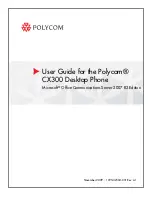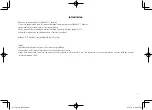
3.2 GSM Mode
3.2.1 GSM Receiver
The Dual-mode L601i’s receiver functions are split between the two RFICs as follows:
• UMTS-2100 operation uses the RFR6250 Receiver ICs to implement the receive signal path,
accepting an RF input and delivering analog baseband outputs (I and Q).
• EGSM-900, DCS-1800, and PCS-1900 modes both use the RTR6250 IC only. Each mode has
independent front-end circuits and down-converters, but they share common baseband circuits (with
only one mode active at a time). All receiver control functions are beginning with SBI
2
-controlled
parameters.
The EGSM, DCS, and PCS receiver inputs of RTR6250 are connected directly to the transceiver front-
end circuits(filters and antenna switch module). EGSM, DCS, and PCS receiver inputs are similar to
the RFR6200 UMTS Rx input in that they also use differential configurations to improve common-
mode rejection and second-order non-linearity performance. The balance between the complementary
signals is critical and must be maintained from the RF filter outputs all the way into the IC pins
Since EGSM, DCS, and PCS signals are time-division duplex (the handset can only receive or
transmit at one time), switches are used to separate Rx and Tx signals in place of frequency duplexers
- this is accomplished in the switch module.
The EGSM, DCS, and PCS receive signals are routed to the RTR6250 through band selection filters
and matching networks that transform single-ended 50-Ω sources to differential impedances optimized
for gain and noise figure. Similar to the RFR, the RTR input uses a differential configuration to improve
second-order inter-modulation and common mode rejection performance. The RTR6250 input stages
include MSM-controlled gain adjustments that maximize receiver dynamic range.
2
The RFIC operating modes and circuit parameters are MSM-controlled through the proprietary 3-line Serial Bus Interface (SBI). The Application
Programming Interface (API) is used to implement SBI commands. The API is documented in AMSS Software - please see applicable AMSS
Software documentation for details.
- 20 -
Z3X-BOX.COM
Summary of Contents for L601i
Page 1: ...Date October 2006 Issue 1 0 Service Manual Model L601i Service Manual L601i Z 3 X B O X C O M ...
Page 3: ... 4 Z 3 X B O X C O M ...
Page 45: ...3 TECHNICAL BRIEF 46 Figure PM6650 2 Functional Block Diagram Z 3 X B O X C O M ...
Page 105: ...4 TROUBLE SHOOTING 106 Audio AMP 22 and 23 pin of CN501 Z 3 X B O X C O M ...
Page 109: ...4 TROUBLE SHOOTING 110 Ear_sense_n pin R506 R507 R505 Z 3 X B O X C O M ...
Page 112: ...4 TROUBLE SHOOTING 113 Q400 Q401 VBAT T GND Z 3 X B O X C O M ...
Page 125: ...5 DOWNLOAD 126 Click on X button to use another function Z 3 X B O X C O M ...
Page 130: ...6 BLOCK DIAGRAM 131 6 2 Interface Diagram L601i Interface Diagram Z 3 X B O X C O M ...
Page 132: ...6 BLOCK DIAGRAM 133 Top Side Z 3 X B O X C O M ...
Page 133: ... Bottom Side 6 BLOCK DIAGRAM 134 Z 3 X B O X C O M ...
Page 141: ... 142 8 PCB LAYOUT Z 3 X B O X C O M ...
Page 142: ... 143 8 PCB LAYOUT Z 3 X B O X C O M ...
Page 143: ... 144 8 PCB LAYOUT Z 3 X B O X C O M ...
Page 144: ... 145 8 PCB LAYOUT Z 3 X B O X C O M ...
Page 145: ... 146 Z 3 X B O X C O M ...
Page 151: ... 152 Z 3 X B O X C O M ...
Page 153: ... 154 Z 3 X B O X C O M ...
Page 176: ...Note Z 3 X B O X C O M ...
Page 177: ...Note Z 3 X B O X C O M ...
















































